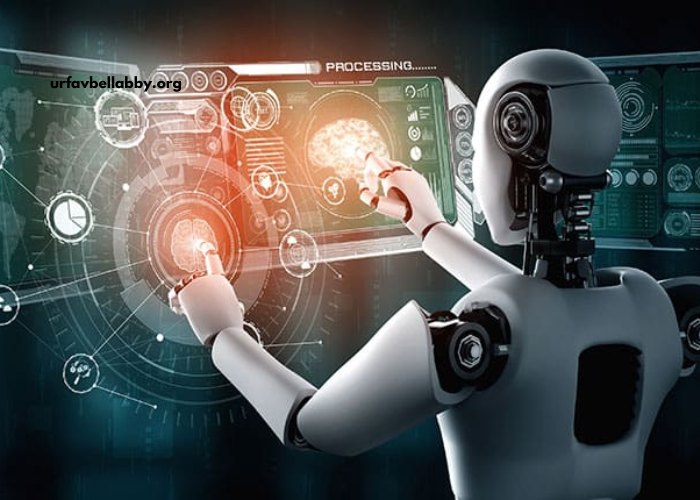Artificial Intelligence (AI) has revolutionized various sectors, from healthcare to finance and manufacturing. AI technology, including machine learning, deep learning, natural language processing, and computer vision, has made a profound impact on how industries operate, innovate, and interact with consumers. The transformative capabilities of AI are undeniable, and as it continues to evolve, its influence on businesses and industries is expected to grow exponentially.
In this article, we will explore how AI is shaping industries by transforming workflows, improving efficiency, enhancing customer experience, and driving innovation. We will also look at real-world applications of AI across various sectors and discuss its future potential.
The Rise of AI in Technology
What is Artificial Intelligence?
Artificial Intelligence refers to the simulation of human intelligence in machines programmed to think and learn like humans. AI systems are designed to perform tasks that typically require human intervention, such as problem-solving, decision-making, speech recognition, and visual perception. These systems analyze vast amounts of data, identify patterns, and learn from experiences, making them increasingly adept at performing complex tasks.
As computing power increases, and access to big data becomes more widespread, AI has been able to evolve rapidly. The development of AI algorithms has empowered machines to not only follow pre-programmed instructions but also to adapt and improve through learning. This adaptability is the key to AI’s success in transforming industries.
AI Technologies Driving Change
Several key technologies form the backbone of AI’s growth and integration into industries:
- Machine Learning (ML): A subset of AI, machine learning enables systems to learn from data without being explicitly programmed. It uses statistical techniques to find patterns in large datasets and make predictions or decisions based on this analysis.
- Deep Learning: A more advanced form of machine learning, deep learning uses artificial neural networks to model high-level abstractions in data. This technology powers applications like speech recognition and image classification.
- Natural Language Processing (NLP): NLP enables machines to understand and process human language. This technology is widely used in chatbots, virtual assistants, sentiment analysis, and language translation.
- Computer Vision: Computer vision allows AI to interpret and understand visual information. It is used in applications like facial recognition, autonomous vehicles, and object detection.
These technologies, combined with other AI advancements, are driving innovation across various industries.
How AI is Shaping Industries
1. AI in Healthcare
AI has made significant strides in healthcare, revolutionizing diagnosis, treatment, and patient care. The ability to process and analyze large datasets from medical records, research, and patient monitoring systems allows AI to assist healthcare professionals in making better-informed decisions.
Predictive Analytics for Patient Care
Machine learning algorithms are being used to analyze patient data and predict outcomes. By identifying patterns and correlations in patient histories, AI can help doctors forecast potential health risks, such as heart attacks, strokes, or even cancer. These predictive tools enable early intervention and personalized treatment plans, leading to better patient outcomes.
AI in Medical Imaging
AI-powered medical imaging technologies use deep learning algorithms to analyze images from X-rays, MRIs, and CT scans. These tools can detect abnormalities such as tumors or fractures with accuracy that rivals or surpasses that of human radiologists. As a result, the diagnostic process is faster, more accurate, and more consistent, improving overall healthcare efficiency.
Virtual Health Assistants
AI-driven virtual assistants are helping patients manage their health more effectively. These digital assistants can remind patients to take medications, track their symptoms, provide health advice, and even schedule appointments with healthcare professionals. This constant support enhances patient engagement and adherence to treatment protocols.
2. AI in Finance
The financial sector has also been significantly impacted by AI, which is improving risk management, fraud detection, and customer service.
Fraud Detection and Prevention
AI algorithms are particularly effective in identifying suspicious activities and fraudulent transactions. Machine learning models are trained to recognize patterns in financial transactions and can quickly detect any anomalies. Banks and financial institutions use these tools to minimize the risk of fraud and ensure that their customers’ funds remain secure.
Algorithmic Trading
AI is reshaping the way trades are executed in financial markets. Algorithmic trading uses AI to analyze market conditions, identify patterns, and make trading decisions at high speeds. These algorithms can respond to market fluctuations faster than human traders, improving trading efficiency and profitability.
Robo-Advisors for Investment Management
AI-powered robo-advisors are becoming increasingly popular in wealth management. These digital platforms use algorithms to analyze a client’s financial situation and goals and recommend tailored investment strategies. Robo-advisors democratize investment management by providing cost-effective services to individuals who may not have access to traditional financial advisors.
3. AI in Manufacturing
AI is playing a pivotal role in transforming manufacturing processes, improving production efficiency, and reducing operational costs.
Predictive Maintenance
Predictive maintenance powered by AI involves monitoring the performance of machinery and equipment in real time. By analyzing sensor data, AI can predict when a machine is likely to fail, allowing for timely maintenance or replacement. This reduces downtime, increases productivity, and lowers the overall maintenance costs for manufacturers.
Robotics and Automation
AI-powered robots are increasingly being used in manufacturing plants to automate repetitive tasks, such as assembly, welding, and packaging. These robots are equipped with computer vision and machine learning capabilities, enabling them to adapt to changing conditions and optimize workflows. The result is improved efficiency, fewer human errors, and lower labor costs.
Supply Chain Optimization
AI technologies are also transforming supply chain management. Machine learning algorithms can analyze data from various sources to predict demand, optimize inventory levels, and identify the most efficient delivery routes. AI-powered systems help manufacturers stay ahead of market trends, reduce waste, and ensure timely delivery of products to customers.
4. AI in Retail
The retail industry is embracing AI to enhance customer experiences, personalize marketing efforts, and streamline operations.
Personalized Shopping Experience
AI enables retailers to provide personalized shopping experiences by analyzing customer data and making recommendations based on past purchases, browsing behavior, and preferences. These AI-driven systems help retailers increase customer satisfaction and boost sales by offering tailored suggestions that appeal to individual consumers.
Virtual Try-Ons and Augmented Reality
AI-powered augmented reality (AR) applications allow customers to virtually try on clothing, makeup, or accessories before making a purchase. This technology enhances the online shopping experience, reducing the likelihood of returns and increasing conversion rates.
Inventory Management and Demand Forecasting
AI is transforming inventory management in retail by improving demand forecasting and optimizing stock levels. Machine learning algorithms analyze historical sales data, customer trends, and external factors such as weather or holidays to predict future demand. This helps retailers avoid stockouts, reduce excess inventory, and optimize their supply chain operations.
5. AI in Transportation and Logistics
The transportation and logistics industries are undergoing a major transformation thanks to AI technologies that improve efficiency, safety, and sustainability.
Autonomous Vehicles
AI is at the heart of autonomous vehicle technology, which is revolutionizing the transportation industry. Self-driving cars, trucks, and drones use AI to navigate, detect obstacles, and make decisions in real-time. These vehicles promise to reduce traffic accidents, lower transportation costs, and improve delivery efficiency.
AI in Route Optimization
AI-powered route optimization tools are used by logistics companies to determine the most efficient routes for delivery vehicles. By analyzing traffic patterns, weather conditions, and other variables, these systems can minimize fuel consumption, reduce delivery times, and improve customer satisfaction.
Smart Traffic Management
AI-driven traffic management systems are helping cities improve traffic flow and reduce congestion. By using real-time data from sensors, cameras, and GPS devices, these systems can dynamically adjust traffic signals, provide alternate routes, and manage traffic more efficiently.
Challenges and Ethical Considerations of AI
While AI has immense potential to drive innovation and improve efficiency across industries, it also presents certain challenges and ethical concerns.
Job Displacement
One of the primary concerns surrounding AI is the potential for job displacement. As AI systems become more capable of performing tasks traditionally handled by humans, there is concern that automation could lead to widespread unemployment. It is essential for governments and businesses to invest in retraining and reskilling programs to help workers transition to new roles.
Privacy and Data Security
AI relies heavily on data, and the collection and analysis of personal information raise significant privacy concerns. Ensuring that AI systems comply with data protection laws, such as the General Data Protection Regulation (GDPR), is essential to safeguarding individuals’ privacy and maintaining trust in AI technology.
Bias and Fairness
AI algorithms are only as good as the data they are trained on. If the data used to train AI systems is biased, the resulting algorithms can produce biased outcomes. This could lead to discrimination in areas such as hiring, lending, or law enforcement. It is crucial for developers to address these biases and ensure that AI systems are fair and equitable.
The Future of AI in Technology
As AI continues to advance, its potential applications across industries will expand. Future developments in AI technology, such as explainable AI, quantum computing, and AI-powered creative tools, will further accelerate its integration into business operations.
The Role of AI in Sustainability
AI also has the potential to contribute significantly to sustainability efforts. AI can be used to optimize energy consumption, reduce waste, and develop eco-friendly solutions in industries such as agriculture, construction, and transportation. By enabling more efficient resource management, AI can help businesses meet their sustainability goals while also reducing their environmental impact.
AI and Human Collaboration
Rather than replacing humans, AI is increasingly seen as a tool that enhances human capabilities. In the future, AI and humans will work together in a collaborative manner, with AI automating routine tasks and humans focusing on higher-level decision-making and creative problem-solving. This partnership will create new opportunities for innovation and growth across industries.
Conclusion
Artificial Intelligence is undeniably reshaping industries in profound and far-reaching ways. From healthcare and finance to retail and manufacturing, AI is improving efficiency, driving innovation, and transforming customer experiences. While challenges such as job displacement and data privacy remain, the future of AI in technology is incredibly promising. By addressing these challenges and continuing to advance AI capabilities, industries can unlock the full potential of AI to create a smarter, more efficient, and sustainable future.
As AI continues to evolve, its influence will only become more pervasive, and businesses that embrace AI technologies today will be better positioned to thrive in tomorrow’s dynamic landscape.





